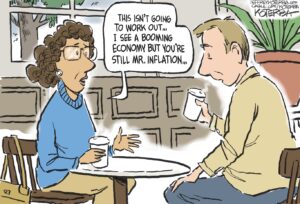Latest Job Numbers Show Why Job Creation Must Take Precedence Over Deficit Reduction
Friday’s jobs report demonstrates an economy that’s still moving in the right direction but way too slowly, which is why Washington’s continuing obsession with the federal budget deficit is insane. Jobs and growth must come first.
This post originally ran on Robert Reich’s Web page, www.robertreich.org.
Friday’s jobs report shows an economy that’s still moving in the right direction but way too slowly, which is why Washington’s continuing obsession with the federal budget deficit is insane. Jobs and growth must come first.
The cost of borrowing is so low — the yield on the ten-year Treasury is near historic lows — and the need for more jobs and better wages so high, and our infrastructure so neglected, that a reasonable government would borrow more to put more Americans to work rebuilding the nation.
Yes, unemployment is down slightly and 146,000 new jobs were created in November. That’s some progress. But don’t be overwhelmed by the hype coming out of Wall Street and the White House, both of which would like the public to believe things are going quite well.
The fact is some 350,000 more people stopped looking for jobs in November, and the percent of the working-age population currently employed continues to drop — now at 63.6%, almost the lowest in 30 years. Meanwhile, the average workweek is stuck at 34.4 hours.
The slowness of the jobs recovery isn’t because of Hurricane Sandy, which it turns out had very little impact on November’s job numbers (the hurricane’s negative effects were more than offset by a Thanksgiving earlier than normal, and an early start to the Christmas buying season). And it’s not because of any uncertainty over the looming “fiscal cliff.” Most consumers in November remained oblivious about any pending cliff.
The reason the economy is still under-performing is overall demand is inadequate. Businesses won’t create more jobs without enough customers. But consumers can’t and won’t spend because they don’t have the money. Unless or until the private sector — businesses and consumers — are able to boost the economy, government must be the spender of last resort.
But the nation has bought into the Republican frame of thinking that we have to “get our fiscal house in order” before the economy can get back on track. Although Barack Obama was reelected and Democrats gained seats in the House and Senate, that frame is still dominating debate.
And even though we’re near a fiscal cliff that illustrates how dangerous deficit reduction can be when so many people are still unemployed, the White House and the Democrats seem incapable of changing the frame of debate.
But remember: Jobs must come first. Job creation must be our first priority.
Robert B. Reich, chancellor’s professor of public policy at UC Berkeley, was secretary of labor in the Clinton administration. Time magazine named him one of the 10 most effective Cabinet secretaries of the last century. He has written 13 books, including the best-sellers “Aftershock” and “The Work of Nations.” His latest, “Beyond Outrage,” is now out in paperback. He is also a founding editor of The American Prospect magazine and chairman of Common Cause.
Your support matters…Independent journalism is under threat and overshadowed by heavily funded mainstream media.
You can help level the playing field. Become a member.
Your tax-deductible contribution keeps us digging beneath the headlines to give you thought-provoking, investigative reporting and analysis that unearths what's really happening- without compromise.
Give today to support our courageous, independent journalists.






You need to be a supporter to comment.
There are currently no responses to this article.
Be the first to respond.